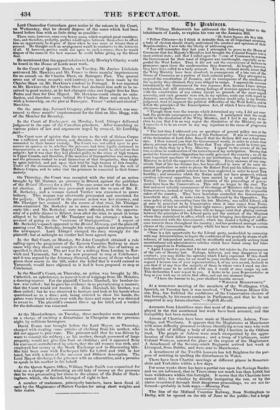Lord Chancellor Cottenham gave notice to the suitors in his
Court; on Wednesday, that he should dispose of the cases which bad been heard before him with as little delay as possible—
There were, however, some very heavy cases, which required great considera-
tion, and therefore, probably, parties would agree between themselves to afford him an opportunity to dispose of them when he was more at leisure than at present. He thought such an arrangement would be conducive to the interests of all. If, however, parties could not agree to such a course, then he would dispose of the cases in the best manner he could before giving up the Great Seal.
He mentioned that the appeal relative to Lady Hewley's Charity would be heard in the House of Lords next week.
In the Court of Queen's Bench, on Tuesday, Mr. Justice Littledule
sentenced Mr. Hawkins and Mr. Fraser to three months' imprisonment for an assault on Sir Charles Shaw, on Ramsgate Pier. The quarrel arose out of some remarks said (untruly) to have been made by Sir Charles Shaw on Mr. Hawkins's conduct in Portugal. It was reported to Mr. Hawkins that Sir Charles Shaw had declared him unfit to be re- ceived in good society, as he had changed sides and fought first for Don Pedro and then for Don Miguel, Mr. Hawkins could obtain no satis- faction,
and therefore came behind Sir Charles Shaw and struck him with a horsewhip, on the pier at Ramsgate. Fraser "aided and abetted" Hawkins.
On the same day, Barnard Gregory, editor of the Satirist, was sen- • tenced to three months' imprisonment for the libel on Mrs. Hogg, wife of the Member for Beverley.
In the Court of Exchequer, on Monday, Lord Abinger delivered judgment in the case of the Canadian prisoners. After remarking on various points of law and arguments urged by coimsel, his Lordship
The Court were of opinion that the return to the writ of Habeas Corpus Was a sufficient and valid return, and, therefore, that the prisoner:4 must be remanded to their former-custody. The Court was not called upon to pro- nounce an opinion as to whether the prisoners had been legally sentenced to transportation or not, as her Majesty's Government would be advised on that subject ; but it was clear they had pleaded guilty to the crime of high treason in Upper Canada, and therefore, if the sentence of transportation was irregular, and the prisoners wished to avail themselves of that irregularity, they might be again indicted, and put upon their trial for high treason in this country. Under all the circumstances, the Court felt bound to discharge the writ of Habeas Corpus, and to order that the prisoners be remanded to their former custody. •
On Thursday, the Court was occupied with the trial of an action
brought by Mr. Harmer, an attorney in Bristol, against the publisher of the Bristol Mercury for a libel. The case arose out of the last Bris- tol election. A petition was presented against the return of Mr. F. H. Berkeley, and a woman named Verner was examined to prove bribery. This woman was afterwards prosecuted and convicted for for perjury. The plaintiff in the present action was her attorney, and Mr. Thesiger her counsel. In the course of that trial, Mr. Thesiger cross-examined Mr. Berkeley as to some connexion with women in early life ; and Mr. Berkeley, very much offended, took the opportu- nity of a public dinner in Bristol. soon after the trial, to speak in terms alleged to be libellous of Mr. Thesiger and the attorney ; whom he accused of going to the "extreme of blackguardism." A. report of Mr. Berkeley's speech appeared in the Bristol Mercury, and the plaintiff, passing over Mr. Berkeley, brought his action against the proprietor of the newspaper. Lord Abinger charged the Jury strongly for the plaintiff; but at midnight no verdict had been agreed upon.
In the Bail Court, on Monday, Sir John Campbell obtained a rule calling upon the proprietors of the Eastern Counties Railway to show cause why they should not complete the whole of the line of railway as specified in their act. The act was for a railway from London to Nor- wich and Yarmouth, but it was now proposed to stop at Colchester ; and it was argued by the Attorney-General, that many of those who had given their assent to the bill, under the belief that it would extend to Yarmouth, would have objected to it had it been proposed to stop at Colchester.
In the Sheriff's Court, on Thursday, an action was brought by Mr. Catherick, an upholsterer, to recover rent of lodgings from Mr. Menzies, a dancing-master. For the plaintiff, Charles Marshall, his brother-in- law, was called ; but he gave his evidence in so prevaricating a manner, that the Court would not receive it. John Marshall, his brother, was then called; but he was observed to hesitate and look at his hands when questioned as to a date ; and, being ordered to show his hands, the palms were found written over with the dates and sums he was directed to swear to. The plaintiff's counsel threw up his brief, and a verdict for the defendant was returned.


























 Previous page
Previous page